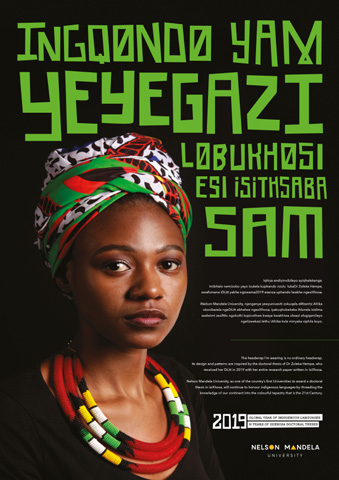
Seven limited edition doeks (head wraps), whose textile designs were inspired by seven isiXhosa doctoral theses awarded by Mandela University to date, tell a rich story.
Ten years ago, Dr Nozuko Zukiswa Gxekwa made history at the institution when she became the first person to complete her doctorate in isiXhosa. Six others have since followed, and another six are registered and conducting their PhD research in isiXhosa.
“Our hope is to engender African aesthetic with academic scholarship – by using visuals to make scholarship more accessible in an authentic way,” says Arts Faculty lecturer Senzo Xulu, who worked with a team of students and staff in conceptualising and realising the Amalaphu Obulumko (“Cloths of Wisdom”) project.
Aimed at recognising the vast diversity and complexity of humanity, each head wrap has taken its inspiration from the research concepts embedded in each thesis and is supported by vernacular postersand beautifully branded packaging.
The textile work was led by Mandela BTech Textile Design student Thandazani Nofingxana, who was a 2018 Design Indaba Emerging Creative. Visual Arts, Public Relations and Media students assisted in creating photographic portraits for the doeks.
“We wanted to bridge the gap between academia, language and creativity after we were challenged by our Dean, Professor (Rose) Boswell, to give creative expression to important academic work, thereby making it accessible in a humanising way,” explains PR lecturer Anele Mvazana, who worked with Xulu on the project.
“We’ve had calls to expand the range and make it available for sale.”
The result: a new, sought-after textile brand that turns indigenous text into textiles. In the interim, however, the team is hosting exhibitions and plans pop-up shops to further educate learners about the value of their mother tongue – a fitting celebration as the Department of Language and Literature recognises the 10-year milestone of awarding ground-breaking doctoral theses written entirely in isiXhosa.